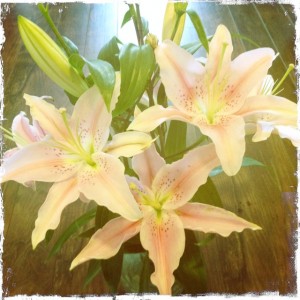 It is May 8, 2010,* the day before Mother’s Day, and I am in Takamori, Japan, with my one-year-old son’s hand in mine, carefully climbing the stone steps to the gate of my husband’s teacher’s temple.
It is May 8, 2010,* the day before Mother’s Day, and I am in Takamori, Japan, with my one-year-old son’s hand in mine, carefully climbing the stone steps to the gate of my husband’s teacher’s temple.
We are here to celebrate Hanamatsuri, or the “Festival of Flowers”—otherwise known as the Buddha’s Birthday.
As we enter the garden, I see that the sliding doors encircling the main building are open to fresh countryside air. A number of families have already settled on their cushions around a statue of the baby Buddha standing beneath a flower-covered canopy.
Soon, the children will be invited to pour sweet tea brewed from the leaves of hydrangea over the likeness, bathing it as tenderly as a real newborn. In this way, the boys and girls are encouraged—briefly—to step into the parental role, an exercise in compassion and generosity.
Today, as I reflect on the first year of caring for my own child, I can’t help but recall the fantastical story of the Buddha’s birth, and of his mother:
At the foot of the Himalayas, the honorable King Suddhodana ruled over the Sakyas warrior tribe. On the night of a full moon, Suddhodana’s wife, the virtuous Queen Maya dreamt of a white elephant clutching a lotus flower in its trunk. Her dream was later interpreted and it was foretold that she would give birth to a son who would come to be great in one of two ways: if he remained in the castle with his family, he would be a conqueror of nations. If he left, he would become wise beyond all measure.
Some months later, the queen was riding in a palanquin to her parents’ home, where she intended to give birth, when she ordered her procession to stop and rest in a beautiful garden. As she entered the grove of flowering trees, she reached up to touch a delicate blossom. At that moment, she gave birth. Afterward, the sky opened over mother and child, and both were bathed in flowers and clear water. Her son then stood, took seven steps, and announced his coming into being. Seven days later, Queen Maya passed out of this life.
There are variations on this story, and all are just as over-the-top. What really grabs me, though, is that instant when Queen Maya both reaches for the blossom and gives birth. This moment is profound because her perspective is suddenly altered in two ways: literally (looking upward) and figuratively (seeing all things through the eyes of a mother). Her new view remains expansive, mind-blowing—the sky opening, a newborn walking and speaking.
As a new mother, I see the truth of my own altered perspective in how I now look on this temple garden, a place I have visited countless times in years past. My re-calibrated gaze hovers just above the knee, and I am constantly aware of the potential reach and speed of a curious toddler in motion.
I see the possibility of danger (ancient stone stairs, dubious bright red berries) and destruction (carefully cultivated moss, paper lanterns arranged just so). I see opportunities for learning and practice and play (a pale moth fluttering from leaf to leaf, a handful of pebbles, a twig pulled across dirt). I see a haven for rest or distraction when the festival activities overwhelm or bore.
But the most powerful and immediate aspect of this new perspective—the view that came to me at that moment of my son’s birth—is a kind of deepened and pervasive empathy for and understanding of the universal human experience, that season-like cycle of impermanence turning in all our gardens.
And so, as my son and I enter the temple and look on the faces of the people there, I cannot help but see the child-self in each adult. I see the man- and woman-becoming in each child. Perhaps because to experience the miracle of new life is to also truly comprehend the inevitability of death, I see the arc of lives. And yes, the enormity of it is absolutely mind-blowing. It is stranger, in fact, than the Buddha’s magical origin story, because it is pure reality.
After my son and I partake in the day’s festivities, we return to the garden and my husband joins us in his long black robes. As he produces the car keys from his sleeve, one of the women calls after us, urging us to wait. She disappears briefly into the temple, and then reappears, striding along the path with a massive bouquet of fragrant white lilies in her arms. “For you, for Mother’s Day,” she says as she offers this gift to me.
My son bursts into giggles when he looks up and sees what I am now holding, as if he’s had some sudden and hilarious insight, and I laugh because he is laughing. At the sight of my child straining to reach the blossoms in my hands, I am experiencing that first moment of motherhood all over again.
(***Most people in Japan consider the Buddha’s Birthday to be April 8, but a few celebrate on May 8.)
